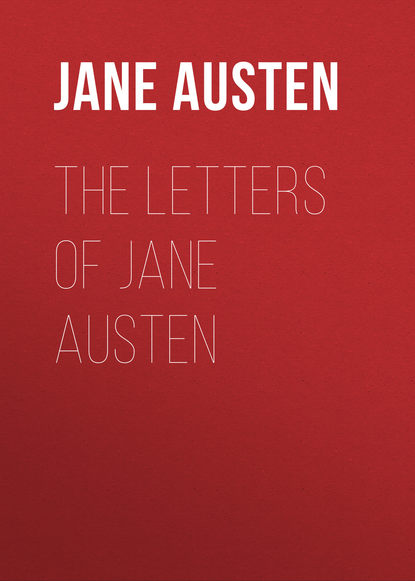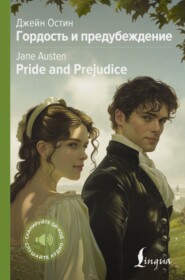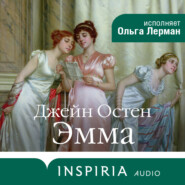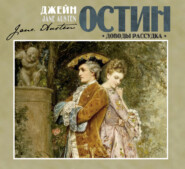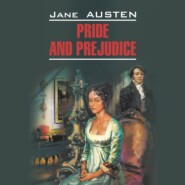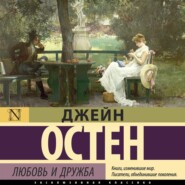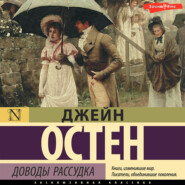По всем вопросам обращайтесь на: info@litportal.ru
(©) 2003-2025.
✖
The Letters of Jane Austen
Настройки чтения
Размер шрифта
Высота строк
Поля
I was agreeably surprised to find Louisa Bridges still here. She looks remarkably well (legacies are very wholesome diet), and is just what she always was. John is at Sandling. You may fancy our dinner-party therefore; Fanny, of course, belonging to it, and little Edward, for that day. He was almost too happy, his happiness at least made him too talkative.
It has struck ten; I must go to breakfast.
Since breakfast I have had a tête-à-tête with Edward in his room; he wanted to know James's plans and mine, and from what his own now are I think it already nearly certain that I shall return when they do, though not with them. Edward will be going about the same time to Alton, where he has business with Mr. Trimmer, and where he means his son should join him; and I shall probably be his companion to that place, and get on afterwards somehow or other.
I should have preferred a rather longer stay here certainly, but there is no prospect of any later conveyance for me, as he does not mean to accompany Edward on his return to Winchester, from a very natural unwillingness to leave Elizabeth at that time. I shall at any rate be glad not to be obliged to be an incumbrance on those who have brought me here, for, as James has no horse, I must feel in their carriage that I am taking his place. We were rather crowded yesterday, though it does not become me to say so, as I and my boa were of the party, and it is not to be supposed but that a child of three years of age was fidgety.
I need scarcely beg you to keep all this to yourself, lest it should get round by Anna's means. She is very kindly inquired after by her friends here, who all regret her not coming with her father and mother.
I left Henry, I hope, free from his tiresome complaint, in other respects well, and thinking with great pleasure of Cheltenham and Stoneleigh.
The brewery scheme is quite at an end: at a meeting of the subscribers last week it was by general, and I believe very hearty, consent dissolved.
The country is very beautiful. I saw as much as ever to admire in my yesterday's journey…
XXV
Castle Square, October 13.
My dearest Cassandra, – I have received your letter, and with most melancholy anxiety was it expected, for the sad news[6 - The death of Mrs. Edward Austen.] reached us last night, but without any particulars. It came in a short letter to Martha from her sister, begun at Steventon and finished in Winchester.
We have felt, we do feel, for you all, as you will not need to be told, – for you, for Fanny, for Henry, for Lady Bridges, and for dearest Edward, whose loss and whose sufferings seem to make those of every other person nothing. God be praised that you can say what you do of him: that he has a religious mind to bear him up, and a disposition that will gradually lead him to comfort.
My dear, dear Fanny, I am so thankful that she has you with her! You will be everything to her; you will give her all the consolation that human aid can give. May the Almighty sustain you all, and keep you, my dearest Cassandra, well; but for the present I dare say you are equal to everything.
You will know that the poor boys are at Steventon. Perhaps it is best for them, as they will have more means of exercise and amusement there than they could have with us, but I own myself disappointed by the arrangement. I should have loved to have them with me at such a time. I shall write to Edward by this post.
We shall, of course, hear from you again very soon, and as often as you can write. We will write as you desire, and I shall add Bookham. Hamstall, I suppose, you write to yourselves, as you do not mention it.
What a comfort that Mrs. Deedes is saved from present misery and alarm! But it will fall heavy upon poor Harriot; and as for Lady B., but that her fortitude does seem truly great, I should fear the effect of such a blow, and so unlooked for. I long to hear more of you all. Of Henry's anguish I think with grief and solicitude; but he will exert himself to be of use and comfort.
With what true sympathy our feelings are shared by Martha you need not be told; she is the friend and sister under every circumstance.
We need not enter into a panegyric on the departed, but it is sweet to think of her great worth, of her solid principles, of her true devotion, her excellence in every relation of life. It is also consolatory to reflect on the shortness of the sufferings which led her from this world to a better.
Farewell for the present, my dearest sister. Tell Edward that we feel for him and pray for him.
Yours affectionately,
J. Austen.
I will write to Catherine.
Perhaps you can give me some directions about mourning.
Miss Austen, Edward Austen's, Esq.,
Godmersham Park, Faversham, Kent.
FOOTNOTE:
XXVI
Castle Square, Saturday night (October 15).
My dear Cassandra, – Your accounts make us as comfortable as we can expect to be at such a time. Edward's loss is terrible, and must be felt as such, and these are too early days indeed to think of moderation in grief, either in him or his afflicted daughter, but soon we may hope that our dear Fanny's sense of duty to that beloved father will rouse her to exertion. For his sake, and as the most acceptable proof of love to the spirit of her departed mother, she will try to be tranquil and resigned. Does she feel you to be a comfort to her, or is she too much overpowered for anything but solitude?
Your account of Lizzy is very interesting. Poor child! One must hope the impression will be strong, and yet one's heart aches for a dejected mind of eight years old.
I suppose you see the corpse? How does it appear? We are anxious to be assured that Edward will not attend the funeral, but when it comes to the point I think he must feel it impossible.
Your parcel shall set off on Monday, and I hope the shoes will fit; Martha and I both tried them on. I shall send you such of your mourning as I think most likely to be useful, reserving for myself your stockings and half the velvet, in which selfish arrangement I know I am doing what you wish.
I am to be in bombazeen and crape, according to what we are told is universal here, and which agrees with Martha's previous observation. My mourning, however, will not impoverish me, for by having my velvet pelisse fresh lined and made up, I am sure I shall have no occasion this winter for anything new of that sort. I take my cloak for the lining, and shall send yours on the chance of its doing something of the same for you, though I believe your pelisse is in better repair than mine. One Miss Baker makes my gown and the other my bonnet, which is to be silk covered with crape.
I have written to Edward Cooper, and hope he will not send one of his letters of cruel comfort to my poor brother: and yesterday I wrote to Alethea Bigg, in reply to a letter from her. She tells us in confidence that Catherine is to be married on Tuesday se'nnight. Mr. Hill is expected at Manydown in the course of the ensuing week.
We are desired by Mrs. Harrison and Miss Austen to say everything proper for them to yourself and Edward on this sad occasion, especially that nothing but a wish of not giving additional trouble where so much is inevitable prevents their writing themselves to express their concern. They seem truly to feel concern.
I am glad you can say what you do of Mrs. Knight and of Goodnestone in general. It is a great relief to me to know that the shock did not make any of them ill. But what a task was yours to announce it! Now I hope you are not overpowered with letter-writing, as Henry and John can ease you of many of your correspondents.
Was Mr. Scudamore in the house at the time, was any application attempted, and is the seizure at all accounted for?
Sunday.– As Edward's letter to his son is not come here, we know that you must have been informed as early as Friday of the boys being at Steventon, which I am glad of.
Upon your letter to Dr. Goddard's being forwarded to them, Mary wrote to ask whether my mother wished to have her grandsons sent to her. We decided on their remaining where they were, which I hope my brother will approve of. I am sure he will do us the justice of believing that in such a decision we sacrificed inclination to what we thought best.
I shall write by the coach to-morrow to Mrs. J. A., and to Edward, about their mourning, though this day's post will probably bring directions to them on that subject from yourselves. I shall certainly make use of the opportunity of addressing our nephew on the most serious of all concerns, as I naturally did in my letter to him before. The poor boys are, perhaps, more comfortable at Steventon than they could be here, but you will understand my feelings with respect to it.
To-morrow will be a dreadful day for you all. Mr. Whitfield's will be a severe duty.[7 - Mr. Whitfield was the Rector of Godmersham at this time, having come there in 1778.] Glad shall I be to hear that it is over.
That you are forever in our thoughts you will not doubt. I see your mournful party in my mind's eye under every varying circumstance of the day; and in the evening especially figure to myself its sad gloom: the efforts to talk, the frequent summons to melancholy orders and cares, and poor Edward, restless in misery, going from one room to another, and perhaps not seldom upstairs, to see all that remains of his Elizabeth. Dearest Fanny must now look upon herself as his prime source of comfort, his dearest friend; as the being who is gradually to supply to him, to the extent that is possible, what he has lost. This consideration will elevate and cheer her.
Adieu. You cannot write too often, as I said before. We are heartily rejoiced that the poor baby gives you no particular anxiety. Kiss dear Lizzy for us. Tell Fanny that I shall write in a day or two to Miss Sharpe.
My mother is not ill.
Yours most truly, J. Austen.
Tell Henry that a hamper of apples is gone to him from Kintbury, and that Mr. Fowle intended writing on Friday (supposing him in London) to beg that the charts, etc., may be consigned to the care of the Palmers. Mrs. Fowle has also written to Miss Palmer to beg she will send for them.
Miss Austen, Edward Austen's, Esq.,
Godmersham Park, Faversham, Kent.
XXVII
Castle Square, Monday (October 24).
My dear Cassandra, – Edward and George came to us soon after seven on Saturday, very well, but very cold, having by choice travelled on the outside, and with no greatcoat but what Mr. Wise, the coachman, good-naturedly spared them of his, as they sat by his side. They were so much chilled when they arrived, that I was afraid they must have taken cold; but it does not seem at all the case: I never saw them looking better.
They behave extremely well in every respect, showing quite as much feeling as one wishes to see, and on every occasion speaking of their father with the liveliest affection. His letter was read over by each of them yesterday, and with many tears; George sobbed aloud, Edward's tears do not flow so easily; but as far as I can judge they are both very properly impressed by what has happened. Miss Lloyd, who is a more impartial judge than I can be, is exceedingly pleased with them.
It has struck ten; I must go to breakfast.
Since breakfast I have had a tête-à-tête with Edward in his room; he wanted to know James's plans and mine, and from what his own now are I think it already nearly certain that I shall return when they do, though not with them. Edward will be going about the same time to Alton, where he has business with Mr. Trimmer, and where he means his son should join him; and I shall probably be his companion to that place, and get on afterwards somehow or other.
I should have preferred a rather longer stay here certainly, but there is no prospect of any later conveyance for me, as he does not mean to accompany Edward on his return to Winchester, from a very natural unwillingness to leave Elizabeth at that time. I shall at any rate be glad not to be obliged to be an incumbrance on those who have brought me here, for, as James has no horse, I must feel in their carriage that I am taking his place. We were rather crowded yesterday, though it does not become me to say so, as I and my boa were of the party, and it is not to be supposed but that a child of three years of age was fidgety.
I need scarcely beg you to keep all this to yourself, lest it should get round by Anna's means. She is very kindly inquired after by her friends here, who all regret her not coming with her father and mother.
I left Henry, I hope, free from his tiresome complaint, in other respects well, and thinking with great pleasure of Cheltenham and Stoneleigh.
The brewery scheme is quite at an end: at a meeting of the subscribers last week it was by general, and I believe very hearty, consent dissolved.
The country is very beautiful. I saw as much as ever to admire in my yesterday's journey…
XXV
Castle Square, October 13.
My dearest Cassandra, – I have received your letter, and with most melancholy anxiety was it expected, for the sad news[6 - The death of Mrs. Edward Austen.] reached us last night, but without any particulars. It came in a short letter to Martha from her sister, begun at Steventon and finished in Winchester.
We have felt, we do feel, for you all, as you will not need to be told, – for you, for Fanny, for Henry, for Lady Bridges, and for dearest Edward, whose loss and whose sufferings seem to make those of every other person nothing. God be praised that you can say what you do of him: that he has a religious mind to bear him up, and a disposition that will gradually lead him to comfort.
My dear, dear Fanny, I am so thankful that she has you with her! You will be everything to her; you will give her all the consolation that human aid can give. May the Almighty sustain you all, and keep you, my dearest Cassandra, well; but for the present I dare say you are equal to everything.
You will know that the poor boys are at Steventon. Perhaps it is best for them, as they will have more means of exercise and amusement there than they could have with us, but I own myself disappointed by the arrangement. I should have loved to have them with me at such a time. I shall write to Edward by this post.
We shall, of course, hear from you again very soon, and as often as you can write. We will write as you desire, and I shall add Bookham. Hamstall, I suppose, you write to yourselves, as you do not mention it.
What a comfort that Mrs. Deedes is saved from present misery and alarm! But it will fall heavy upon poor Harriot; and as for Lady B., but that her fortitude does seem truly great, I should fear the effect of such a blow, and so unlooked for. I long to hear more of you all. Of Henry's anguish I think with grief and solicitude; but he will exert himself to be of use and comfort.
With what true sympathy our feelings are shared by Martha you need not be told; she is the friend and sister under every circumstance.
We need not enter into a panegyric on the departed, but it is sweet to think of her great worth, of her solid principles, of her true devotion, her excellence in every relation of life. It is also consolatory to reflect on the shortness of the sufferings which led her from this world to a better.
Farewell for the present, my dearest sister. Tell Edward that we feel for him and pray for him.
Yours affectionately,
J. Austen.
I will write to Catherine.
Perhaps you can give me some directions about mourning.
Miss Austen, Edward Austen's, Esq.,
Godmersham Park, Faversham, Kent.
FOOTNOTE:
XXVI
Castle Square, Saturday night (October 15).
My dear Cassandra, – Your accounts make us as comfortable as we can expect to be at such a time. Edward's loss is terrible, and must be felt as such, and these are too early days indeed to think of moderation in grief, either in him or his afflicted daughter, but soon we may hope that our dear Fanny's sense of duty to that beloved father will rouse her to exertion. For his sake, and as the most acceptable proof of love to the spirit of her departed mother, she will try to be tranquil and resigned. Does she feel you to be a comfort to her, or is she too much overpowered for anything but solitude?
Your account of Lizzy is very interesting. Poor child! One must hope the impression will be strong, and yet one's heart aches for a dejected mind of eight years old.
I suppose you see the corpse? How does it appear? We are anxious to be assured that Edward will not attend the funeral, but when it comes to the point I think he must feel it impossible.
Your parcel shall set off on Monday, and I hope the shoes will fit; Martha and I both tried them on. I shall send you such of your mourning as I think most likely to be useful, reserving for myself your stockings and half the velvet, in which selfish arrangement I know I am doing what you wish.
I am to be in bombazeen and crape, according to what we are told is universal here, and which agrees with Martha's previous observation. My mourning, however, will not impoverish me, for by having my velvet pelisse fresh lined and made up, I am sure I shall have no occasion this winter for anything new of that sort. I take my cloak for the lining, and shall send yours on the chance of its doing something of the same for you, though I believe your pelisse is in better repair than mine. One Miss Baker makes my gown and the other my bonnet, which is to be silk covered with crape.
I have written to Edward Cooper, and hope he will not send one of his letters of cruel comfort to my poor brother: and yesterday I wrote to Alethea Bigg, in reply to a letter from her. She tells us in confidence that Catherine is to be married on Tuesday se'nnight. Mr. Hill is expected at Manydown in the course of the ensuing week.
We are desired by Mrs. Harrison and Miss Austen to say everything proper for them to yourself and Edward on this sad occasion, especially that nothing but a wish of not giving additional trouble where so much is inevitable prevents their writing themselves to express their concern. They seem truly to feel concern.
I am glad you can say what you do of Mrs. Knight and of Goodnestone in general. It is a great relief to me to know that the shock did not make any of them ill. But what a task was yours to announce it! Now I hope you are not overpowered with letter-writing, as Henry and John can ease you of many of your correspondents.
Was Mr. Scudamore in the house at the time, was any application attempted, and is the seizure at all accounted for?
Sunday.– As Edward's letter to his son is not come here, we know that you must have been informed as early as Friday of the boys being at Steventon, which I am glad of.
Upon your letter to Dr. Goddard's being forwarded to them, Mary wrote to ask whether my mother wished to have her grandsons sent to her. We decided on their remaining where they were, which I hope my brother will approve of. I am sure he will do us the justice of believing that in such a decision we sacrificed inclination to what we thought best.
I shall write by the coach to-morrow to Mrs. J. A., and to Edward, about their mourning, though this day's post will probably bring directions to them on that subject from yourselves. I shall certainly make use of the opportunity of addressing our nephew on the most serious of all concerns, as I naturally did in my letter to him before. The poor boys are, perhaps, more comfortable at Steventon than they could be here, but you will understand my feelings with respect to it.
To-morrow will be a dreadful day for you all. Mr. Whitfield's will be a severe duty.[7 - Mr. Whitfield was the Rector of Godmersham at this time, having come there in 1778.] Glad shall I be to hear that it is over.
That you are forever in our thoughts you will not doubt. I see your mournful party in my mind's eye under every varying circumstance of the day; and in the evening especially figure to myself its sad gloom: the efforts to talk, the frequent summons to melancholy orders and cares, and poor Edward, restless in misery, going from one room to another, and perhaps not seldom upstairs, to see all that remains of his Elizabeth. Dearest Fanny must now look upon herself as his prime source of comfort, his dearest friend; as the being who is gradually to supply to him, to the extent that is possible, what he has lost. This consideration will elevate and cheer her.
Adieu. You cannot write too often, as I said before. We are heartily rejoiced that the poor baby gives you no particular anxiety. Kiss dear Lizzy for us. Tell Fanny that I shall write in a day or two to Miss Sharpe.
My mother is not ill.
Yours most truly, J. Austen.
Tell Henry that a hamper of apples is gone to him from Kintbury, and that Mr. Fowle intended writing on Friday (supposing him in London) to beg that the charts, etc., may be consigned to the care of the Palmers. Mrs. Fowle has also written to Miss Palmer to beg she will send for them.
Miss Austen, Edward Austen's, Esq.,
Godmersham Park, Faversham, Kent.
XXVII
Castle Square, Monday (October 24).
My dear Cassandra, – Edward and George came to us soon after seven on Saturday, very well, but very cold, having by choice travelled on the outside, and with no greatcoat but what Mr. Wise, the coachman, good-naturedly spared them of his, as they sat by his side. They were so much chilled when they arrived, that I was afraid they must have taken cold; but it does not seem at all the case: I never saw them looking better.
They behave extremely well in every respect, showing quite as much feeling as one wishes to see, and on every occasion speaking of their father with the liveliest affection. His letter was read over by each of them yesterday, and with many tears; George sobbed aloud, Edward's tears do not flow so easily; but as far as I can judge they are both very properly impressed by what has happened. Miss Lloyd, who is a more impartial judge than I can be, is exceedingly pleased with them.





